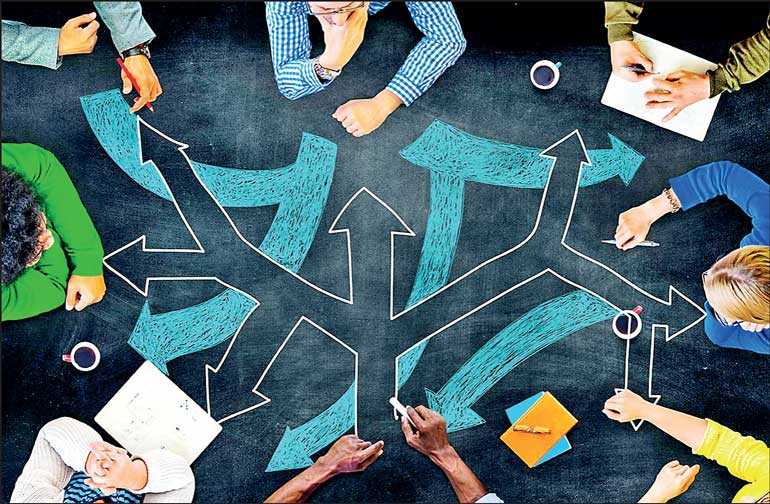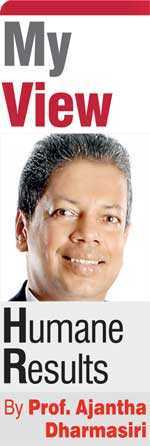Monday Feb 16, 2026
Monday Feb 16, 2026
Monday, 8 March 2021 00:00 - - {{hitsCtrl.values.hits}}

The global pandemic unleashed on the world by COVID-19 creates a fundamental test of public values for leaders and decision-makers both within and between nations. This harsh test reveals the collective responsibility that we share for self and others in uncertain situations of shared risk and the critical role of leadership in decision-making and mobilising collective action
 The vaccination is in full swing in Sri Lanka. The AstraZeneca vaccine branded COVISHIELD has been already given to over a half million citizens. It was a key decision made by the officials in line with global practices in combating COVID-19.
The vaccination is in full swing in Sri Lanka. The AstraZeneca vaccine branded COVISHIELD has been already given to over a half million citizens. It was a key decision made by the officials in line with global practices in combating COVID-19.
Decision-making under crisis situations could be confusingly complex unless handled with the needed clarity and commitment. It is in fact a clarion call for a ‘glocal’ response where global realities and local responses should be rightfully blended. Today’s column is a reflection of crisis decision-making on a global scale with implications to Sri Lanka.
Overview
I came across a comprehensive research published in the Public Administration Review Journal which has high relevance to Sri Lanka. The five authors namely, Louise K. Comfort of University of Pittsburgh, Naim Kapucu of University of Central Florida, Kilkon Ko of Seoul National University, Scare Menoni of Politecnico di Milano and Michael Siciliano of University of Illinois at Chicago have examined the basic functions of crisis decision-making—cognition, communication, coordination, and control—in response to COVID-19.
This crisis decision-making framework is applied to cases from South Korea, Italy, and the United States as public officials grapple with how to recognise, respond, and recover from this deadly, invisible threat.
The authors have acknowledged the harsh trade-off between the compelling need to limit transmission of the virus to protect public health and the consequent economic losses of halting social interaction. They have drawn implications from this crisis for better decision-making and investment in a global information infrastructure system to manage large-scale, multidisciplinary threats to the health, economy, and sustainability of the world’s community of nations.
The essay concludes that collective cognition, amplified by timely, valid communication and supported by sound planning, trained personnel, appropriate technology, and bold leadership, enables coordinated action needed to bring a large-scale global crisis under control.
Decision-making in uncertain conditions
Public leaders have a key responsibility for protecting the lives and livelihoods of their constituents. In routine times, they may follow time-honoured procedures honed over decades of experience, confident that lessons from the past will guide them. As Louise K. Comfort of University of Pittsburgh highlighted, for public leaders facing unknown risks, decision-making is fraught with uncertainty and becomes an adaptive process that has four distinct components: (1) cognition, (2) communication, (3) coordination, and (4) control. Under conditions of COVID-19, how public leaders exercised these four functions proved critical in different contexts.
Cognition
As Comfort further observes, in crisis management, cognition is the “capacity to recognise the degree of emerging risk to which a community is exposed and to act on that information”. Importantly, cognition provides the transition to action. It constitutes not simply the perception of risk to self but also comprehension of the risk to others. That is, action taken may help oneself, but action not taken may irretrievably harm others. The fundamental component of empathy in cognition creates a human connection to others who share the risk and spurs collective action for the benefit of the community as a whole. We saw a glimpse of this reality in the way of handling the first wave of the pandemic in Sri Lanka.
Public leaders had difficulty recognising the depth, scale, and lethality of COVID-19, observe the authors. From the first slow, sobering discovery of the virus as it emerged in Wuhan, China, to the broad determination that ordinary methods of treating the novel coronavirus were ineffective, cognition came late to public leaders in individual countries as they searched unsuccessfully through old models of dealing with contagion. By the time public leaders recognised the lethality of COVID-19, it was already spreading silently in their communities. While measures to suppress social interaction slowed the spread of the virus, they also created a cruel trade-off by shutting down schools, travel, commerce, and cultural activities that make societies function.
Communication
“It’s going to disappear. One day, it’s like a miracle, it will disappear,” repeated Donald Trump, President of the US, many times last year. It is quite the opposite to what really happened. Communication could be viewed as a process that links sender and receiver in shared comprehension of messages. In doing so, communication creates shared meaning among actors with different roles. It is the means used to inform partner agencies in the global community as well as the public in different nations about the potential risk and rationale for evidence-based mitigation measures and the need for collective response.
As the authors clearly observe, effective communication to explain COVID-19 to the public as an invisible, novel, deadly threat requires strong leadership, timely and evidence-based information, and trust to build broad public consensus to support collective action. We Sri Lankans still struggle to convince some sections of the society regarding the needed disciplinary approach.
Coordination
Coordination in this context can be described as the degree to which organisations align their resources, tasks, and time to engage in interdependent functions to achieve a shared goal. In complex environments, coordination requires articulation of shared goals among diverse actors in response to shared risk.
“Be fast, have no regrets... If you need to be right before you move, you will never win,” said Mike Ryan, epidemiologist at WHO, last year. Coping with the risk of COVID-19, each nation faced decisions about how to align the components of their respective national response systems in ways that would slow or stop transmission of the virus, actions that would also contribute to the global goal.
Public leaders build trust with their constituents through timely, informed communication, enabling citizens to accept the validity of proposed actions for both self and community and to act, collectively, under the extraordinary constraints of crises. The creation of the National Operation Centre for Prevention of COVID-19 Outbreak (NOCPCO) in Sri Lanka was a concrete step in the right direction.
Control
Control can be viewed as the capacity to respond to an external threat and still maintain regular operations in the society. In reference to COVID-19, control means achieving a reasonable balance between mitigating the spread of the infection, building health care capacity, and managing a safe level of economic and social activity. The global crisis generated by COVID-19 requires coordination not only across jurisdictional boundaries within countries but also across national boundaries to bring this massive pandemic under effective control. This is where we have been having major challenges in Sri Lanka leading to a chaotic second wave.
“Human kindness has never weakened the stamina or softened the fibre of free people; A nation does not have to be cruel to be tough”, so said Franklin D. Roosevelt. The balance between enforcing controls and ensuring continuity is a tough task in the hands of key decision-makers. We saw this here and abroad alike.
Clarity in moving ahead
“This pandemic has magnified every existing inequality in our society – like systemic racism, gender inequality, and poverty,” said Melinda Gates last in an interview last year. The dilemma between public health and economic functions remains at both the global and national scales, observe the authors.
The global pandemic unleashed on the world by COVID-19 creates a fundamental test of public values for leaders and decision-makers both within and between nations. This harsh test reveals the collective responsibility that we share for self and others in uncertain situations of shared risk and the critical role of leadership in decision-making and mobilising collective action. It demonstrates the critical role of cognition in precipitating action, as the three countries revealed very different patterns of performance after identifying their first cases of the disease.
South Korea already, as a case in point, had plans in place after the 2015 MERS threat and quickly devised new programs and policies to strengthen existing capacity in response to COVID-19. Italy identified the threat of the pandemic early but had several weaknesses in preparedness and health care capacity that did not allow its early recognition to translate into effective practical interventions.
As we saw in the media, the United States faced a critical fragmentation in cognition between scientific experts and political leaders that delayed substantive action at the federal level for over two months, leading to exponential increases in both cases and deaths. These divergent degrees of cognition led to mixed patterns of communication at the federal level and fractured efforts at coordination across a large country, while leadership at state and municipal levels gained the trust and support of their citizens and the large majority, 70% of US residents, supported stay-at-home policies.
As the authors observe, the COVID-19 pandemic reveals a rare opportunity to redesign global and national systems for managing deadly risks, using science-based evidence and information communication technology. This is to identify, track, search, and share timely, valid data among nations, triggering innovation and collective action to build a resilient international community. The authors are of the view that bold redesign of existing international organisations such as the World Health Organisation, that monitor and compare the status of global risk would reinforce cognition in facilitating effective crisis response across the globe by partnering with nations to work with their local communities.
Enhanced coordination and exchange of good practices among member nations of the global community would save not only hundreds of thousands of lives but forgo trillions of dollars in economic losses, anguish, and pain. It would mean expanding networks of research, collaboration, and knowledge sharing among the world’s scientists, scholars, public managers, and students in shared exploration of means for identifying and reducing emerging risks.
Such a move would include building and maintaining a global information infrastructure to support continuous learning and adaptation to a changing environment for both professional practitioners and researchers. It would involve designing and implementing plans for a global health infrastructure and training the personnel who would staff and maintain it, with secure funding sustained by responsible international contributions and oversight. The fact that Sri Lankan health care system, despite its shortcomings has demonstrated its constructive adherence to WHO guidelines is an encouraging sign of a global collaborative effort.
Way forward
“Be safe, be smart, be kind,” said Dr. Tedros Adhanom Ghebreyesus, WHO Director General, in the first months of the pandemic. With insight gained from the precedent-shattering experience of this pandemic and bold public leadership, nations of the world have a unique policy window for transforming global governance capacity to strengthen and maintain public health and, reciprocally, sustain the global economy. We in Sri Lanka are no exception but to contribute locally, regionally and global, in aligning with health guidelines. That is the ‘glocal’ response required with sensible decision-making.
(Prof. Ajantha S. Dharmasiri can be reached through [email protected], [email protected] or www.ajanthadharmasiri.info.)